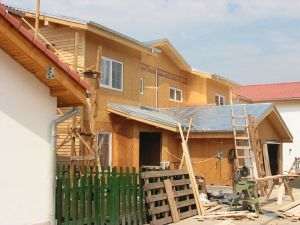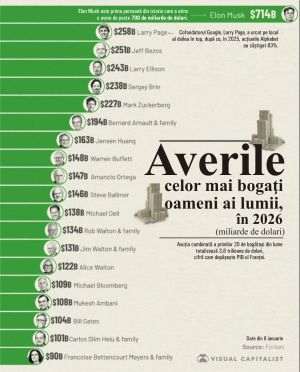The amounts paid to banks by the National Fund for the Guarantee and Counterguarantee of Small and Medium Enterprises Loans (FNGCIMM) for the First Home Program get recouped from debtors, through foreclosure, by the National Fiscal Administration Agency (ANAF), the representatives of the Ministry of Public Finances told us, and they mentioned that that aspect discourages debtors from defaulting on their payments under the First Home Program.
The statements of the Ministry of Public Finances come in response to the inquiry by BURSA on whether the government is ready to handle a wave of non-performing loans that may arise if the interest rates on loans will increase in the following years.
Among other things, the representatives of the Ministry of Public Finances told us the following: "The amounts guaranteed by the FNGCIMM are paid to the lender by the Ministry of Public Finances from the state budget, through the budget of the Ministry of Public Finances - General Actions Department, and are recouped through foreclosures, by the competent entities of the National Fiscal Administration Agency from the natural person beneficiaries of the secured loan, according to the legislation in effect applicable to debt collection.
The First Home Program is exempted from the Law of Giving in Payment, which means that in the event of a default, debtors get foreclosed on and cannot benefit from the giving in payment mechanism, which decreases the likelihood of them defaulting on their payments, or of the default rate, respectively".
According to the quoted sources, one of the eligibility criteria for the lenders that grant loans for a completed home guaranteed under the government program is "for the total cost of the financing granted as part of the program not to exceed the 3-month ROBOR plus a margin of a maximum of 2% per annum for loans denominated in lei, with the margin also including the total level of commissions charged by the lender". That requirement, along with the guarantee by the state of the mortgage-type loans taken out under the Program, leads to the increased debtors' ability to repay the loans contracted through the Program, the MFP representatives say.
Analysts of CFA Romania have recently announced that they expect the interest rates and inflation to rise in the coming 12 months, the leu to weaken against the Euro and the global macroeconomic situation to worsen.
57.4% of the analysts interviewed by the CFA expect 3-month interest rates in lei to increase on the interbank market.
The trend mentioned by the members of CFA România is also confirmed by the expectations of the Financial-Banking Analysts. According to a poll conducted by them, the National Bank of Romania (NBR) will maintain, in 2017, the policy rate of 1.75% a year, but next year will raise it to 2.5%, "which will also lead to banks raising the interest rates, both on loans and deposits".
Just last week, economists announced that interest rates on loans may increase considerably in the second half of the year, due to the rise in inflation.
Ciprian Dascălu, chief-economist with ING Bank, mentioned, quoted by a TV network, that in the second half of the year, he expects "upwards adjustments of the interest rate", amid the forecasts that the inflation will rise to 1.7%.
In the case of a First Home loan, the monthly repayment could increase by as much as 10%, and the total repayable amount until the end of the loan could increase by as much as 10,000 Euros in lei, if considering a raise of the ROBOR by just one percentage point, according to Digi24.
At the same time, one bank has doubled the down payment required for the first Home Program and other financial institutions are considering doing the same.
Romanian banking customers who have loans denominated in lei have started 2017 with higher interest rates than last year, given that the ROBOR indicators that the interest rates on loans denominated in the local currency are tied to have increased towards the end of 2016.
In the case of loans whose interest involves the application of 3-month ROBOR - the most frequently encountered category, given the fact that it includes the First Home loans -, the interest rate for the first quarter of this year is 0.21 percentage points higher than the last quarter of 2016, since the reference indicator rose from 0.69% per annum on September 30, to 0.9% on December 30, 2016.
In spite of that, in the first quarter of 2017, the interest rates on ongoing loans denominated in lei are 0.12 percentage points lower over the similar period of 2016, because the benchmark indicator for that period stood at 1.02% a year.
The First Home program may disappear this year, lawyer Gheorghe Piperea recently said, who mentioned: "I predict that the First Home program will disappear this year. I hope that the PSD will keep its word, that it wants to see a program of that nature which will truly be a social program, for the people, not one of state aid for banks and for real estate developers". In the opinion of Gheorghe Piperea, the problem with the First Home program is the fact that the interest rates and inflation will rise, which will cause the number of defaults, which are relatively rare at the moment, under that program, to increase in number.
Gheorghe Piperea told us: "Defaulting on a payment coming due under that program has very serious consequences - the Romanian government pays up half of the collateral, then forecloses on that home in favor of the bank, and then the government subrogates the bank and pursues the debtor for the balance of the debt, because it isn't erased after foreclosure. Not only does it pursue the debtor, but it also charges it penalties of up to 18% per year - the penalties level practiced by the ANAF. The debtor becomes a taxpayer".
Lawyer Gheorghe Piperea thinks that the decision to eliminate the First Home program under the effect of the Law of giving in payment will prove to have been catastrophic, because it will "lead to very serious social issues, and those loans will turn into social cases".
He said: "Debtors will not qualify for giving in payment directly, but, based on the argumentation of the CCR concerning the Law of giving in payment, people who have borrowed under the First Home program will also be able to resort to that law, in order to rebalance the contract or to terminate its effects, which means the erasing of the debt and the foreclosure of the real estate asset, based on the Civil Code".
The representative of the Ministry of Public Finances also told us that the lender is entitled to foreclose on the collateral only if it has sent to the FNGCIMM the request for payment within the validity period of the guarantee, after having recorded the entire guaranteed loan as in default, provided the repayments on the principal of the loan are at least 60 days overdue. Within at most 85 calendar days from receiving the payment request, the FNGCIMM decides on whether to approve or deny it.
The quoted sources further said: "The payment of the guarantee is done under the terms and conditions stipulated in the protocol, the implementation convention, the guarantee convention and the guarantee agreement, within a maximum of 90 calendar days from the date of the FNGCIMM receiving the payment request, sent by the lender.
The estimation of the amounts pertaining to the default situations is based on a default rate that is lower than in the case of normal mortgage loans, which is of just 0.3%".
Between the launch of the First Home program, - in 2009 - and until the end of November 2016, 203,783 guarantees have been paid, with a total amount of 17.5 billion lei, according to information from the Ministry of Public Finances. Since the beginning of last year and until the end of November, 32,747 guarantees have been granted, with a total amount of 3.1 billion lei.
The quoted sources recently said: "So far, 767 requests for payment have been recorded as part of the program, of which, by December 29th, 2016, just 521 have been paid, and the total amount of the guarantees paid is 44,077,264.79 lei. A number of 130 requests for foreclosure, with a total amount of 540,281.65 lei and 2,151,748.80 Euros have been denied". Out of the foreclosed guarantees, a number of 14 guarantees, with a total amount of 1,098,768.98 lei, have been restored, and the difference is represented by requests for foreclosure of the recorded guarantees which have been withdrawn, as the afferent guarantees are still in effect, and the requests for analysis, for which no issues of payment rejections have been issued yet, as the deadlines for their resolutions are set in 2017.




















































